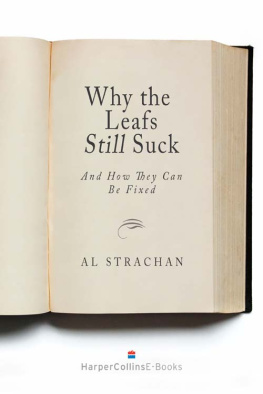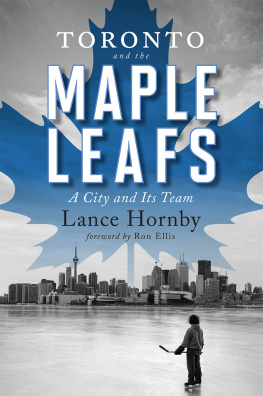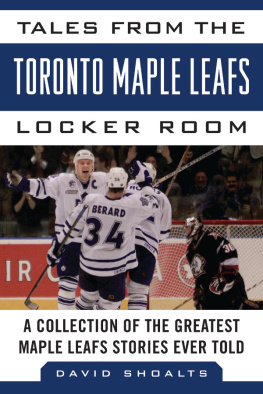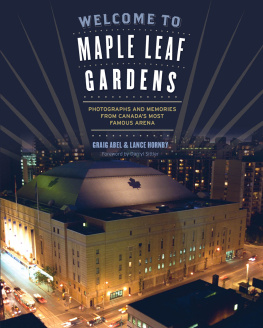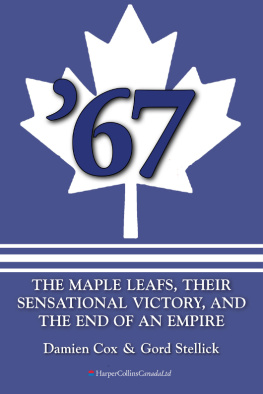The gap between us, I would always have thought, was at least the distance between Lenin and Genghis Khan, Willie and Ozzie Nelson, Donald Brashear and Pavel Datsyuk.
If Al Strachan and I ever ended up playing for the same hockey teamand a couple of times we sort of did, as I dressed for the Canadian media in the annual CanadaU.S.A. slaughter during All-Star weekends, while Al variously baited opposition players from behind the bench and exhorted us Canadian players to run up the scoreId be left wing, hed be right, Id be floating up near the blue line waiting to cherry pick, hed be catching someone with his head down and parking him somewhere into next week.
Friends? Not very likely
I first encountered Strach, as everyone calls him, in printas a sports reporter for the Montreal Gazette, then a sports reporter and columnist with The Globe and Mail out of Toronto. On the page, he was sharp, tough, accurate and challenging. If he had a bone to pick, he used a lance to pick it. No shying away; no backing down; no apologies. And he knew the game, something that cannot always be said about those who make their living explaining sports events to those who can read.
Getting to know him as a person took some time, as I was in magazines when he was first in newspapers and then in Ottawa when he was in Toronto. I covered the Ottawa Senators when he was covering the Maple Leafs, which was a bit like being imbedded with the Lancasters and the Yorks during the Wars of the Rosesa bitter conflict Strach, I could not possibly know then, could likely have discoursed knowingly about while those about him scratched their heads in wonder. How does he know these things?
When I did get to know him well was, much to my shock, during the modern NHLs first lockout, the shutting down of the league for the start of the 199495 season. I knew, as everyone did, that Strach had long had a friendly relationship with the games biggest star, Wayne Gretzky, and when word began spreading that Gretzky and some of his hockey pals were planning a barnstorming tour of Europe to put in the time, Strach called to suggest I come along. It was both a generous suggestion and a welcome one, as I was desperate myself for something to write about in the Ottawa Citizen sports pages. The paper agreed and off we all went, flying out of Detroit, on one of the greatest sports jaunts in hockey history.
I got to know an entirely new Al Strachan on that trip. Not just that hes eccentric enough to pour his beer from one glass to another endlesslyGets rid of the gas, he claims, patting back a burpbut that he is erudite, widely read, bright and extremely funny. Thanks to Strach and his long-time pal Tony Gallagher of the Vancouver Province, I found myself daily in stitches. Strach has one of the most irreverent, wickedand totally politically incorrectsenses of humour that law currently permits. I found myself laughing, uproariously, at things in other years I might have marched against.
Take this wicked sense of humour, and this astounding understanding of the game, and you have the perfect author for Why the Leafs Suck. Strach was there during the Monty Pythonesque Ballard years, there during the dreary decades that followedand is still there for the New Age Leafs of general manager Brian Burke and coach Ron Wilson. They wont like what they read. But then, Strach has always written for his readers, not his subjectsagain, something that separates him from the pack.
If youve ever been to a circus, think of Strach as the guy in the black top hat and red tailcoats, smiling deviously as he snaps his whip from centre stage.
And take this book for what it is: a three-ring delight, certain to thrill, guaranteed to amuse, sure to infuriate and impossible to put down.
While it may drive some Leaf fans to drink who arent already there, I predict sales through the roof in Ottawa.
And embraced, as well, in every other place where the true joys of the great game are appreciatedfrom loving the manner of play to laughing at the main players.
Roy MacGregor
Are you trying to get me to totally disown you? asked my son Andrew.
Andrew is thirty-one, and for as many of those thirty-one years as he has been capable of forming a comprehensive thought, he has been a fan of the Toronto Maple Leafs.
When the Leafs lost the seventh game of the Western Conference semifinal to the Los Angeles Kings in 1993, he locked himself in his room and refused to talk to me, as if I deserved the blame. After all, I counted Wayne Gretzky among my friends, and Gretzky had single-handedly eviscerated the Leafs, so who elses fault could it be? Surely the Leafs themselves couldnt be responsible for the loss.
Over the years, I managed to convince Andrew that I neither liked nor disliked the Leafs. Most of their players were good guys, but the closer you got to the top of the organization, the less enjoyable the experience of dealing with them tended to be.
I pointed out that I had pretty much the same relationship with all the other teams in the National Hockey League. NHL players are, for the most part, articulate, accessible and accommodating. I had an affinity for certain players, but not for any specific team.
Even so, when Andrew learned that I was writing a book entitled Why the Leafs Suck, the revelation did not go over particularly well.
Hes like millions of Leafs fans. To himand to themthere is only one team that matters. They are the members of Leafs Nation. They bleed blue and white. They wear the gear. They get the tattoos. Leafs fans they were born, Leafs fans they will die.
You have to admire their devotion to their team and their dedication to the cause. If you suggest to them that maybe the tattoo wasnt such a good idea because affinities to sports teams can change over the years, they look at you with undisguised horror. Ill always be a Leafs fan, they say.
And really, it is for them that I wrote this book. They deserve better and perhaps, if theyre aware of some of the history of this team and are given clear evidence of the shoddy manner in which theyve been treated by this organization, they might be able to see through the corporate misinformation that is routinely shovelled onto them, and thereby be better positioned to demand improvement.
When I was writing newspaper columns in Toronto, people would often suggest that because I ridiculed the way the Leafs operated, or because I berated the organization for yet another ill-advised decision, I was biased against the team. That wasnt the case. It is the job of columnists to point out the foibles, and when you get right down to it, that puts us on the side of the fans.
We dont do it because were for or against a specific team, but because it is our duty to use the special access we are given and the inside information we acquire to apprise the fans of a situation that might otherwise be kept from their view.
The word media is Latin in origin. It means in the middle. The media are in the middle, between the fans and the organization. Its not reasonable to expect a team to grant dressing-room access to every fan, or for the players to answer every fans questions. Instead, a middleman is useda media person.
And if youve been accorded that responsibility, is it fair to the fans that youre supposed to represent to then mislead them? Should the media join the teams attempts to paint everything it does in a favourable light? Should they become an extension of the teams public-relations department?

